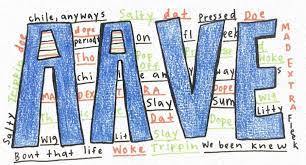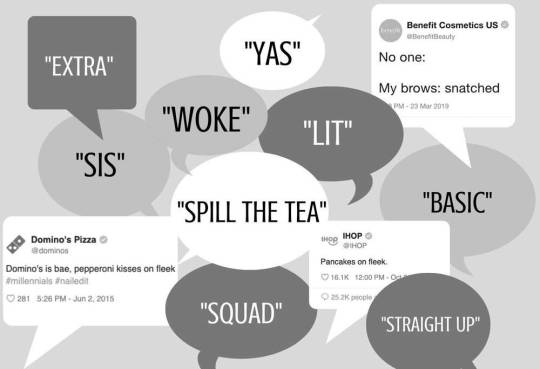Don't wanna be here? Send us removal request.
Text
youtube
This is a perfect example of AAVE being used solely because of it being a trending topic. This popular influencer is using AAVE in an exaggerated way and has gotten backlash for it. And although watching this video made me a bit uncomfortable, I can't fully blame her for growing up during a time where it's popular to try to be as Black as possible. She is just trying to fit in, but that still does not make it right. I think we have gotten too comfortable with people adopting a persona based on Black culture for whatever reason. This should not be the case. There is a big difference between admiration and exaggeration. And this example is just a small part of a bigger problem that needs to be addressed.
0 notes
Text
What IS AAVE?

African-American Vernacular English is a language with its own set of vocabulary, phonology and grammar. Therefore, it has a set of rules to follow, just like any other language, meaning there are wrong ways to speak it and specific things that distinguish it from others.
0 notes
Text
“As the preceding examples show, many of these historically “black” words refer to unique aspects of the black experience, including the physical attributes, social distinctions, and cultural practices and traditions of African Americans.”
- Rickford and Rickford
0 notes
Text
In Rickford and Rickford’s Spoken Soul, it is said that "similarly, for most casual commentators, what sets black talk apart is its distinctive word usage, particularly the informal and usually short-lived “slang” expressions known primarily to adolescents and young adults.“ Although some vocabulary can be viewed as that, most others used in AAVE by everyone is specifically from our experiences as African Americans. To understand AAVE, it is important to understand that, "many of these historically “black” words refer to unique aspects of the black experience, including the physical attributes, social distinctions, and cultural practices and traditions of African Americans." An example that my family uses a lot is 'beady beads' and it refers to the back of the neck where our hair tends to be the curliest and needs to be brushed out. This area is also known as the 'kitchen' as described in the reading.

0 notes
Text
“But sometimes what’s distinctive happens with syllables. Take, for instance, the fact that blacks place the stress on the first rather than the second syllable, as in PO-lice and HO-tel, or the fact that blacks (especially older ones) delete the unstressed initial and medial syllables in words like (a)bout, (be)cause, (a)fraid, and sec(re)t(a)ry more often than whites do.”
- Rickford and Rickford
0 notes
Text
AAVE has unique speech and pronunciation. According to Rickford and Rickford, "some black consonant pronunciations—such as aks (or axe) for “ask”—are shibboleths of vernacular black speech." I remember a time in high school when I went up to my teacher during class and said "can I ask you a question about this assignment.” Instead of responding, he began to question me back on my pronunciation of the word 'ask.' I had never actually realized I said it in a weird way, because it is so natural for me to say 'axe' in conversation. And I never really saw it as a big deal until I was called out about it. Nowadays, I am cautious about even saying the word at all, because of that incident. It made me feel like I was lower than that teacher in terms of social class because of how harshly I was judged. As it turns out, this is a completely normal thing for speakers of AAVE to do. The reading describes it as an example of metathesis and it happens in Standard English for words like “comfortable” in order to simplify the pronunciation of the word.
0 notes
Text
“Second, aks for “ask” is an example of metathesis—switching two consonants in a word, often to achieve an easier articulation. (An example from Standard English is “comfortable,” where the t is sometimes pronounced before the r, even though it’s spelled with r before t.) Another example in Spoken Soul is the pronunciation of “wasp” as waps, but that is much less common than aks for “ask''.
- Rickford and Rickford
0 notes
Text
What AAVE is NOT:

AAVE is NOT some “Blaccent” as the internet puts it. Calling it a “Blaccent” when another race uses it for clout (fame and influence) on the internet crosses the line of culture appropriation. Black culture has a strong influence on social media and its trends and fashion. Yet there are many people who are ignorant and believe AAVE is just internet culture. The internet constantly tries to take Black people out of Black culture. Society used to claim that using AAVE, which was called Ebonics before, would set us back as a people. Even the honored poet Maya Angelou was against the use of it in school. She believed that, "the very idea that African-American language is a language separate and apart can be very threatening, because it can encourage young men and women not to learn standard English." But the standard of all Americans primarily speaking Standard English is built on institutional racism. It is incredibly whitewashed because it assumes that the ideal language and behavior is that of white people. Black people had to get familiar with code-switching to Standard English at school or work and then going back to speaking comfortably when in other places. AAVE was just not acceptable to anyone before.
1 note
·
View note
Text
Now that social media has started to highlight how creative and entertaining Black people are, lots of other people are trying to appropriate the culture for attention. In an attempt to not be called out, some even try to justify their actions by saying that it’s just internet slang or stan culture. A White woman, known as the “kombucha girl” from a TikTok meme, has made millions of followers on the platform. There, she posted a video of her thoughts on when it is appropriate for non-Black people to use AAVE. She says, “I feel like it’s a very fine line between genuinely calling out a creator that’s using AAVE or the Blaccent for like, putting it on for comedic purposes versus like quoting something. You know what I mean? Like the Nicki Minaj thing, 'Big boobs?...Chile, anyway,' that's a meme, obviously. So when someone is quoting that or when someone says like 'period,' 'sis,' 'snatch,' all that, it's very much like internet culture. Like stan twitter. Stan culture has its own language". She received a lot of backlash for these comments and has since deleted the video noting, "I made some videos speaking my mind on something I wasn't properly educated on (AAVE) and I've since taken all the videos down". Although she realized her mistake and quickly changed her stance on the issue, this is an example of a common misconception of the language on the internet.
0 notes
Text
There is no issue with anyone using words or slang that come from AAVE. I actually appreciate that other people like it so much. The problem is when it’s used as a disrespectful joke, spoken grammatically incorrect, or appropriated by trying to convince others that Black people aren’t the creators. I don’t think anyone would want something so precious to them stolen away like that. You can not consume Black culture, or any culture, without giving credit or at least acknowledging the people it comes from. So I’m sick of the internet getting to deciding when Black culture is “trashy” and when it is “trendy”.

1 note
·
View note
Text
Bibliography:
Rickford, John R, Russell J. Rickford, and Geneva Smitherman (2000). Spoken Soul: The Story of Black English.
0 notes

